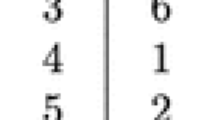Abstract
Suppose that two players, P1 and P2, must divide a set of indivisible items that each strictly ranks from best to worst. Assuming that the number of items is even, suppose also that the players desire that the allocations be balanced (each player gets half the items), item-wise envy-free (EF), and Pareto-optimal (PO). Meeting this ideal is frequently impossible. If so, we find a balanced maximal partial allocation of items to the players that is EF, though it may not be PO. Then, we show how to augment it so that it becomes a complete allocation (all items are allocated) that is EF for one player (Pi) and almost-EF for the other player (Pj) in the sense that it is EF for Pj except for one item — it would be EF for Pj if a specific item assigned to Pi were removed. Moreover, we show how low-ranked (for Pj) that exceptional item may be, thereby finding an almost-EF allocation that is as close as possible to EF — as well as complete, balanced, and PO. We provide algorithms to find such almost-EF allocations, adapted from algorithms that apply when complete balanced EF-PO allocations are possible.
Similar content being viewed by others
Availability of Data and Materials
Data sharing is not applicable to this article as no datasets were generated or analyzed during this study.
Code Availability
Not applicable.
Notes
Throughout, we follow the convention that when one player is named Pi, the other player is Pj. Thus, when i = 1, j = 2, and when i = 2, j = 1.
The matching need not be unique. Assume P1 ranks four items 1 \(\succ\) 2 \(\succ\) 3 \(\succ\) 4, and P2 ranks them in reverse order: 4 \(\succ\) 3 \(\succ\) 2 \(\succ\) 1. Then assigning {1, 2} to P1 and {3, 4} to P2 yields two matchings in which P1 pairwise prefers each of its items to the matched item of P2: (1 \(\succ\) 3, 2 \(\succ\) 4) and (1 \(\succ\) 4, 2 \(\succ\) 3). The same two matches, exactly reversed, show that P2 pairwise prefers its allocation to P1’s. Thus, if an allocation is EF, P1’s and P2’s matchings may be inverses—as illustrated by this example—but need not be, as illustrated by Example 1 in Sect. 2.
Pruhs and Woeginger [17] provide a different, but equivalent, condition.
We use the same symbol, \(\succ\) , for a player’s ranking of items and for the player’s preference on subsets of items, as the latter is an extension of the former.
Statement (iii) in Lemma 5 of Pruhs and Woeginger [17] is equivalent to D(S).
The definition to follow can be compared to the definition of “EF up to 1 item, or EF1” in the literature [11]. In our context, where the only available information about preferences over subsets is what can be inferred from the rankings of items, it is a natural analog and extension. For a different approach to almost-EF, see Bilò et al. [3].
References
Aziz H, Caragiannis I, Igarashi A, Walsh T (2019) Fair allocation of combinations of indivisible goods and chores. Proc Twenty-Eighth Int Joint Conf Artificial Intel (IJCAI-19) 53–59
Barberà S, Bossert W, Pattanaik PK (2004) Ranking sets of objects. In Barberà, S., Hammond, P.J., and C. Seidl (eds). Handbook Util Theor. Springer, Boston, MA
Bilò V, Caragiannis I, Flammini M, Igarashi A, Monaco G, Peters D, Vinci C, Zwicker WS (2018) Almost envy-free allocations with connected bundles. arXiv:1808.09406
Bouveret S, Chevaleyre Y, Maudet N (2016) Fair allocation of indivisible goods. In Brandt, F., Conitzer, V., Endriss, U., Lang, J., and A.D. Procaccia (eds). Handbook of computational social choice, Cambridge University Press, New York. 284–310
Brams SJ, Fishburn P (2000) Fair division of indivisible items between two people with identical preferences: envy-freeness, Pareto-optimality, and equity. Soc Choice Welfare 17:247–267
Brams SJ, Kilgour DM, Klamler C (2012) The undercut procedure: an algorithm for the envy-free division of indivisible items. Soc Choice Welfare 39(2–3): 615–631
Brams SJ, Kilgour DM, Klamler C (2014) Two-person fair division of indivisible items: an efficient, envy-free algorithm. Notices of the AMS 61(2):130–141
Brams SJ, Kilgour DM, Klamler C (2015) How to divide things fairly. Math Magazine 88(5):338–348
Brams SJ, Kilgour DM, Klamler C (2017) Maximin envy-free division of indivisible items. Group Decis Negot 46(1):115–131
Brams SJ, King D (2005) Efficient fair division: help the worst off or avoid envy? Rational Soc 17(4):387–421
Budish E (2011) The combinatorial assignment problem: approximate competitive equilibrium from equal incomes. J Polit Econ 119(6):1061–1103
Caragiannis I, Gravin N, Huang X (2019a) Envy-freeness up to any item with high Nash welfare: the virtue of donating items. Proc of the 2019 ACM Conf Econ Comput (EC-19):527–545
Caragiannis I, Kurokawa D, Moulin H, Procaccia AD, Shah N, Wang J (2019b) The unreasonable fairness of maximum Nash welfare. ACM Transact Econ Comput 7(3)
Kilgour DM, Vetschera R (2018) Two-player fair division of indivisible items: comparison of algorithms. Eur J Oper Res 271(2):620–631
Klamler C (2021) The notion of fair division in negotiations. In: Kilgour DM, Eden C (eds) Handbook of group decision and negotiation, 2nd edn. Springer, Cham, 81–109
Plaut B, Roughgarden T (2020) Almost envy-freeness with general valuations. SIAM J Discret Math 34(2):1039–1068
Pruhs K, Woeginger GJ (2012) Divorcing made easy FUN 2012:305–314
Sen A (1999) The possibility of social choice. Am Econ Rev 89(3):349–378
Stanley RP (2015) Enumerative combinatorics. Cambridge University Press, Cambridge, UK, 2
Funding
D. Marc Kilgour’s research is supported by an NSERC Discovery Grant.
Author information
Authors and Affiliations
Corresponding author
Ethics declarations
Conflict of Interest
The authors declare no competing interests.
Additional information
Publisher's Note
Springer Nature remains neutral with regard to jurisdictional claims in published maps and institutional affiliations.
Rights and permissions
About this article
Cite this article
Brams, S.J., Kilgour, D.M. & Klamler, C. Two-Person Fair Division of Indivisible Items when Envy-Freeness is Impossible. Oper. Res. Forum 3, 24 (2022). https://doi.org/10.1007/s43069-021-00115-7
Received:
Accepted:
Published:
DOI: https://doi.org/10.1007/s43069-021-00115-7




